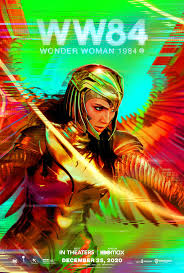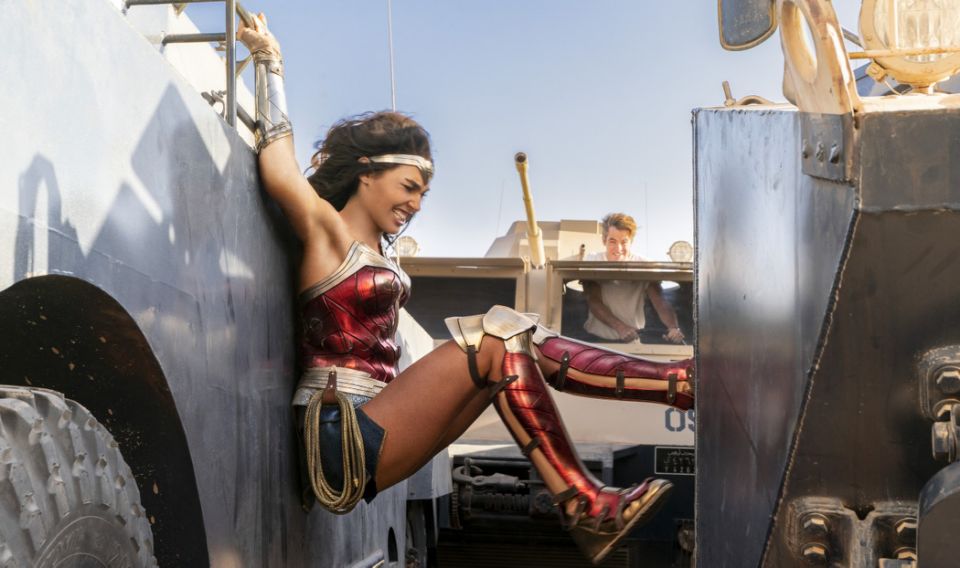By Lynn Lee
 Heading into this strange winter holiday season, Wonder Woman 1984 faces a daunting double challenge even for one of the world’s most iconic superheroes. First, as a movie, does it live up to the widely acclaimed first Wonder Woman? Second, will its performance – by whatever metrics apply in COVID times – justify Warner Bros’ decision to release the movie simultaneously in theaters and on its newly controversial streaming platform HBOMax?
Heading into this strange winter holiday season, Wonder Woman 1984 faces a daunting double challenge even for one of the world’s most iconic superheroes. First, as a movie, does it live up to the widely acclaimed first Wonder Woman? Second, will its performance – by whatever metrics apply in COVID times – justify Warner Bros’ decision to release the movie simultaneously in theaters and on its newly controversial streaming platform HBOMax?
The jury’s still out on the second question, but the answer to the first, alas, is no. Wonder Woman 1984 is a mess. Despite that fact, it’s also surprisingly enjoyable, due to the charisma of its cast and residual goodwill from its 2017 predecessor. But as the movie that may shape the future not only of the Wonder Woman franchise but of movies as we know them, it’s a worryingly slender reed to bear such pressure...
As its title promises, the sequel picks up in mid-’80s Washington, D.C., after a brief introductory flashback to our heroine’s childhood in the Amazonian paradise Themyscira that gives us a fun, if unnecessary, preview of the movie’s moral message.
Seven decades after the events of the first Wonder Woman movie, Diana (Gal Gadot, luminous as ever) is working as an anthropologist for the Smithsonian Institution in D.C. and moonlighting as an anonymous crimefighter who manages never to be captured on camera. (Why anonymous, and what else she’s been doing since World War I, is never really explained, even though foiling urban crimes seems kind of...small bore for Wonder Woman.)

She still carries a torch for her lost WWI love, Steve Trevor (Chris Pine), and doesn’t seem close to anyone at this point in her life, though she does befriend a klutzy, insecure new Smithsonian mineralogist, Barbara Minerva (Kristen Wiig), who’s tasked with identifying stolen antiquities that include a seemingly worthless stone of unknown provenance. The stone turns out to have extraordinary properties that make it the target of the movie’s chief villain, television celebrity and snake oil salesman masquerading as oil mogul Max Lord (Pedro Pascal), whose veneer of wealth is eroding faster than you can say “Donald Trump” and who sees the stone as the key to realizing his ambitions.
It is and it isn’t; to say more would give away too much of the plot, such as it is. While the stone may be a Macguffin, the head-scratching narrative developments it precipitates turn out to be the movie’s downfall. Nothing Max Lord does once he [minor spoiler] gets hold of the stone makes any sense, nor do any of the consequences of his actions, which escalate to the impending collapse of human civilization in muddled, improbably accelerated fashion. Very little else about the movie’s major plot turns makes much sense, either, from the behavior of the petty thieves Wonder Woman defeats at the outset to the manner in which her beloved Steve [not a spoiler if you’ve seen any advertising] comes back into her life. (Vulture has a funny commentary on that plot point.) I do give the writers credit for not making the climax the kind of big blowout CGI-fest battle that always bores me in superhero movies. What they offer instead – a simple, borderline simplistic appeal to both the characters’ and audience’s humanity – feels truer to the Wonder Woman spirit, but once again at the expense of narrative logic.

And also, perhaps, at the expense of fans who want to see Diana kick physical as well as moral ass. The action set pieces in WW84 are adequate without being particularly memorable – nothing on par with the epic No Man’s Land scene in the first Wonder Woman – though they do show a new vulnerability in Diana that ups the dramatic ante. The lasso of truth gets a good workout, and the writers find a cute way to incorporate Wonder Woman’s invisible plane into the narrative. But too much of the movie focuses on Lord’s frantic machinations to accumulate more power, with Diana and Steve trailing behind him. Even the ’80s trappings, which should have been a selling point, feel perfunctory and largely fade away as the story goes on.
With all these flaws, why did I still enjoy Wonder Woman 1984? Mostly because of the cast. Gadot’s magnetism makes it easier to accept Diana’s relative passivity and reactiveness in this outing, and her chemistry with Pine remains potent—even if the movie’s attempt to make Steve the cultural fish out of water this time, while mildly funny, only reminds the viewer of how much better the first movie was in this department, too. (Part of it is Gadot really gives off the air of an otherworldly being who could be genuinely mystified by modern human artifices, whereas Pine comes across as savvy and contemporary regardless of where and when he turns up.) There’s a reasonable argument that bringing back Steve dilutes his emotional impact in both WW movies, yet there’s no denying that 1984 would be much less watchable without his cool, low-key charm and willingness to play loving, level-headed backup to Diana.

1984 also gets good mileage—up to a point—out of Wiig’s Barbara, whose desire to be like Diana drives her transformation [technically a spoiler] into the super-strong, sexy Cheetah. Wiig wisely underplays rather than exaggerates both sides of her character, and her interactions with Gadot made me wonder what a queer take on her relationship with Diana could look like. (Come on, Patty Jenkins, you know you’d like to have had a go at that!) Unfortunately, after a promising beginning, she ends up underutilized (and eventually buried under CGI that brings up bad associations with Cats), as the focus shifts to the much less interesting Max Lord.
Pascal, for his part, gamely does his best with a go-big-or-go-home approach to the role, imputing a manic, increasingly desperate quality to the archvillain’s smarminess that suggests his evildoing – like Barbara’s – is rooted in deep-seated insecurity, but it’s not enough to flesh out a character who’s given virtually no narrative context for why he’s doing whatever the hell it is he’s doing. Not until near the end of the movie do we get a blink-and-miss flashback montage that shows a glimpse of Lord’s past and hints at how it shaped his psychology, but by then it’s far too little too late.
All in all, while Wonder Woman 1984 whiffs on narrative and thematic coherence and barely ekes out a passing grade for its new characters, it gets just enough moments right to keep you invested in its heroine and her quest to protect and redeem humanity. Whether it’s enough to get her another movie is anybody’s guess at this point. Sadly, that question likely depends on a host of factors that have nothing to do with this movie’s merits and everything to do with Warner Brothers’ decisionmaking calculus.

Grade: B- (probably should be a C+, but my desire to see the Wonder Woman series continue is showing)